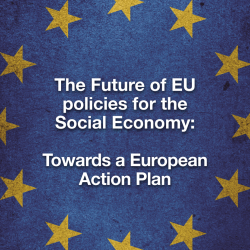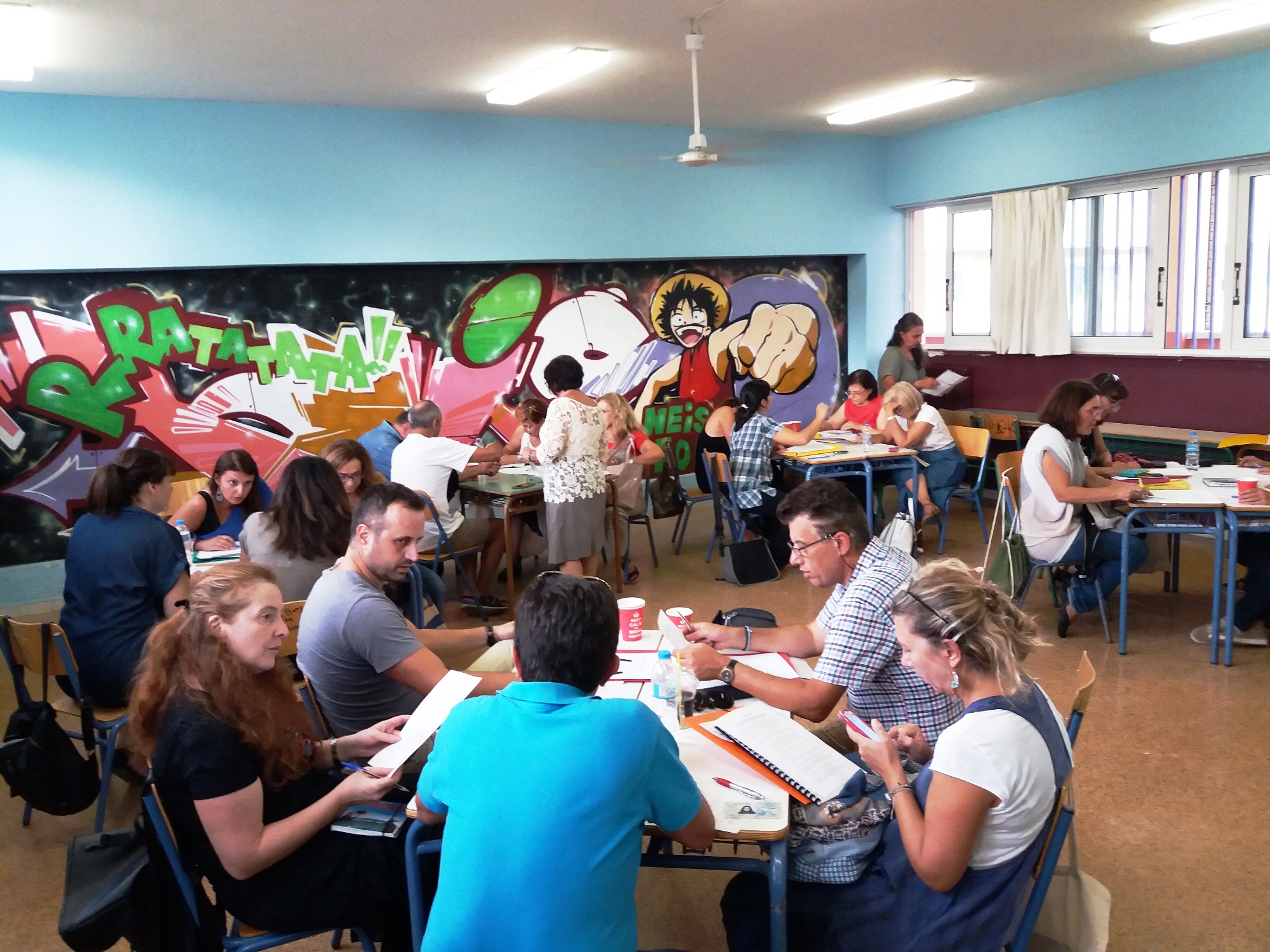
Social Economy Europe produced recently a document on “The future of the EU policies for the Social Economy: towards a European ActionPlan“. This document defines a series of axes and actions that may serve as a basis for elaborating a European Action Plan for the social economy. The proposals included in this document take into account the very important work that has been carried out by all EU institutions and particularly by the European Commission in recent years to support the development of the social economy. Furthermore, these proposals are the result of a consultation process in which all Social Economy Europe members have actively participated.
What Social Economy can bring to the European Union
The Council of the European Union defined the social economy as a key driver of economic and social development in Europe. According to the European Economic and Social Committee’ study on the Recent evolutions of the Social Economy in the European Union there are 2.8 million social economy enterprises and organisations in the European Union, that employ 13.6 million people and represent 8% of the EU’s GDP. Therefore, the social economy is a crucial part of the EU socio-economic landscape. The social economy refers to a wide diversity of enterprises and organisations -cooperatives, mutuals, associations, foundations, social enterprises, paritarian institutions of social protection etc.- that share common values and features such as the primacy of the individual and the social objective over capital, a democratic governance, and the reinvestment of most of the profits/ surpluses to carry out sustainable development objectives, services of interest to members or of general interest.
The social economy is formed by enterprises and organisations of all sizes -ranging from SMEs to large companies and groups- that operate in all the economic sectors such as: industry, education, healthcare and social services of general interest, agri-food, ethical and cooperative banking, insurance, renewable energy, re-use and recycling, retail and consumption; housing, tourism, culture and leisure, building, professional services, digital economy, etc. Because of its strong social commitment, the social economy offers innovative solutions to the main economic, social and environmental challenges of our time.
In short, the social economy is an enterprise model for the future of Europe that, thanks to its defining values and principles, contributes to several key objectives of the EU.
The social economy is “a European success story” that has increasingly gained political visibility as a sector that constitutes an important pillar notably in terms of employment and social cohesion across Europe and as key actor for the achievement of the United Nation’s 2030 Agenda for Sustainable Development, setting up the sustainable development goals. In this sense, the European Parliament, the Council of the European Union, the European Economic and Social Committee, Member States, the Commission Expert Group on Social Entrepreneurship and social economy representative organisations have consistently called for the development of an ambitious European policy for the social economy with adequate resources proportionate to its socio-economic weight in the European Union.
In 2016, the European Commission adopted the Start-up and Scale-up Initiative containing a section on social economy and social enterprises. On that basis, the Commission has set up and implemented (in 2017 and 2018) a series of actions for the social economy and social enterprises, structured in five pillars:
1. Access to funding;
2. Access to markets;
3. Improving framework conditions;
4. Social innovation, technologies and new business models;
5. International dimension
However, the implementation of these important actions will come to an end in 2018. In this context, social economy representative organisations, led by Social Economy Europe; the European Parliament’s Social Economy Intergroup, the European Economic and Social Committee and an important number of Member States are calling on the European Commission to take a step forward towards a European Action Plan for the social economy. This Action Plan shall serve to boost the visibility of social economy enterprises and organisations; support them to generate social and technological innovations; improve their access to finance and EU funding; remove the legal obstacles impeding their ability to grow and operate in the Single Market on an equal footing with other types of companies; as well as inspiring public authorities from the EU and its neighbouring countries to promote the growth of the social economy as a driver of economic and social progress for all.
Furthermore, this Action Plan should also serve to boost the uptake of new technologies in social economy enterprises and organisations. Digitalisation, blockchain, big data and artificial intelligence, among other emerging technologies, represent an enormous opportunity for the growth of social economy companies and for the creation of social economy start-ups in Europe. By adapting to this technological revolution, social economy enterprises will bring their values of solidarity, democracy and sustainability to the new economy.
A European Action Plan for the social economy, with a proposed duration of 5 years (2020-2025), shall be a key tool to systematically incorporate the social economy into the different socio-economic policies of the European Union, as well as into its actions to achieve the Sustainable Development Goals.
The objectives of this proposal for an Action Plan are the following:
Objective 1 Recognise the social economy as a transversal actor in the main socioeconomic policies of the European Union: Social economy enterprises and organisations operate in all the economic sectors and represent an important part of the European economic and corporate landscape (more than 10% of all EU business), demonstrating that the diversity of enterprise models enhances the competitiveness of our economies. Therefore, the social economy should be taken into account by the European institutions, Member States and all public authorities in the design of their socio-economic policies.
Objective 2 Promote the convergence and coordination of the different public authorities involved in the promotion of the social economy by defining strategic objectives and benchmarks at EU level: Various administrations at local, regional, national and EU level are directly involved in the regulation and promotion of the social economy. Therefore, it would be important to set-up a European policy framework for the social economy to enhance the coherence, complementarity and coordination of the different policies and regulations, remaining respectful of the principle of subsidiarity.
Objective 3 Foster a conducive ecosystem for the growth of the social economy in Europe, improving its contribution to key EU objectives and allowing social economy enterprises to take full advantage of the single market and of EU funds and financial instruments: The social economy has been one of the drivers of European integration, offering innovative solutions to address evolving socio-economic challenges. The EU institutions should initiate appropriate actions to foster the development of the social economy and to unlock all its potential for a smart, sustainable and inclusive growth at the service of European citizens.
In line with these three objectives, this policy proposal includes 20 policy measures and 64 actions structured in 7 pillars:
1. Establish a common understanding of social economy enterprises and organisations in Europe
2. Improve the visibility of social economy enterprises and organisations and of their values and characteristics
3. Measure and further document the weight of the social economy and its effective contribution to the socio-economic development of the European Union
4. Provide in the framework of the European Single Market a conducive ecosystem for the growth of social economy enterprises and organisations, supporting them to access to finance and scale up, and by establishing the necessary legal framework, allowing them to fully operate trans-nationally in the Single Market.
5. Further integrate the social economy in EU funds and programmes, such as the ERDF, ESF Plus and the cohesion funds
6. Foster the role of the social economy in the external action of the European Union
7. Consolidate and strengthen a permanent and structured dialogue between EU institutions and the Social Economy
About Social Economy Europe
Social Economy Europe (SEE) was created in November 2000 under the name of CEP-CMAF -the European Standing Conference of Cooperatives, Mutuals, Associations and Foundationswith the purpose of establishing a permanent dialogue between the social economy and the European Institutions. In 2008, CEP-CMAF changed its name and officially became the “Social Economy Europe”.
SEE members are the European organisations of mutual and cooperative insurers, non-profit healthcare players, health mutuals and health insurance funds; industrial and service cooperatives; foundations, associations of general interest, work integration social enterprises, paritarian institutions of social protection, ethical banks and financiers, and the European Cities and Regions for the social economy.
At national level, SEE represents the national social economy organisations of France (ESS-France), Italy (National Third Sector Forum), Portugal (CASES), Spain (CEPES) and Belgium (ConcertES). Social Economy Europe’s mission is to:
– Represent the interests of the social economy in the European Union so that the main EU policies promote and take into consideration this enterprise model;
– Promote the dialogue and the inter-cooperation between its members and develop new services of common interest;
– Boost the visibility of the economic and social impact of the social economy and of the values and principles that define this virtuous enterprise model;
– Support the Member States and the national organizations aiming to promote the development of the social economy.
SEE believes in a European Union that is determined to promote economic and social progress of its Member States, and that acknowledges its key role as global social economy leader. SEE believes in:
– A diverse economy at the service of people.
– A democratic, sustainable and inclusive economy, strongly committed to society;
– A more favourable ecosystem for the development of the European social economy, that will keep offering innovative solutions in response to societal demands.
– The social economy’s active participation in the development and implementation of the main socio-economic policies of the European Union.
